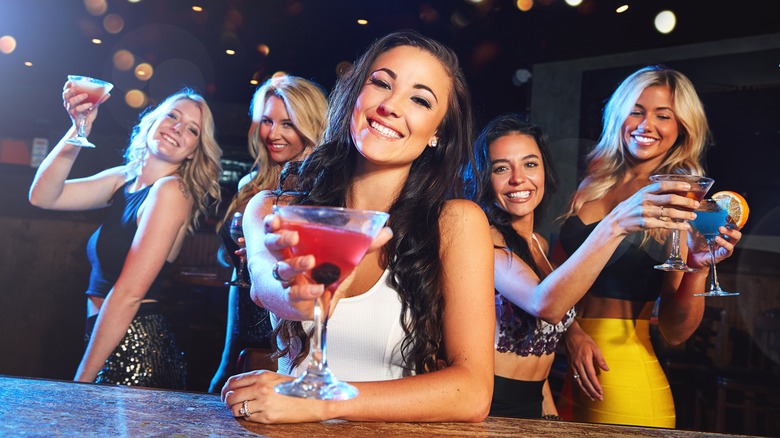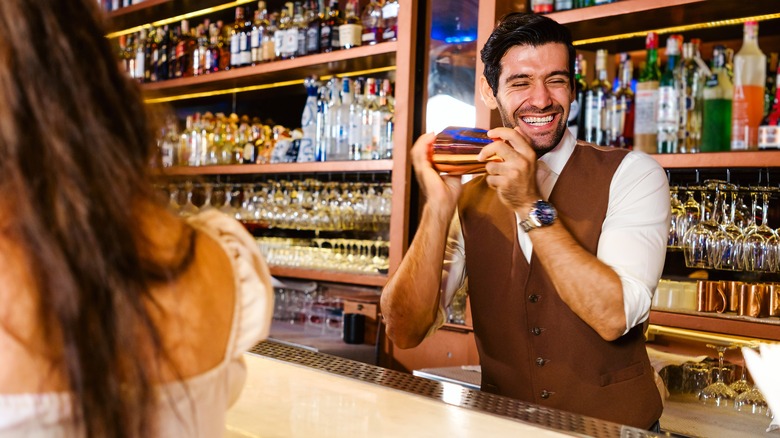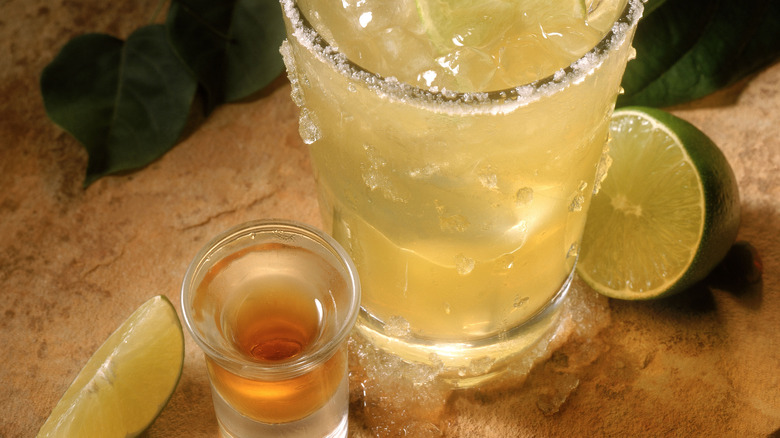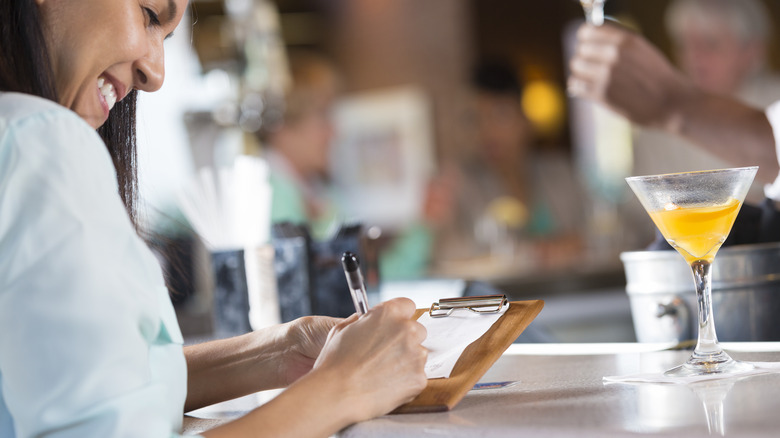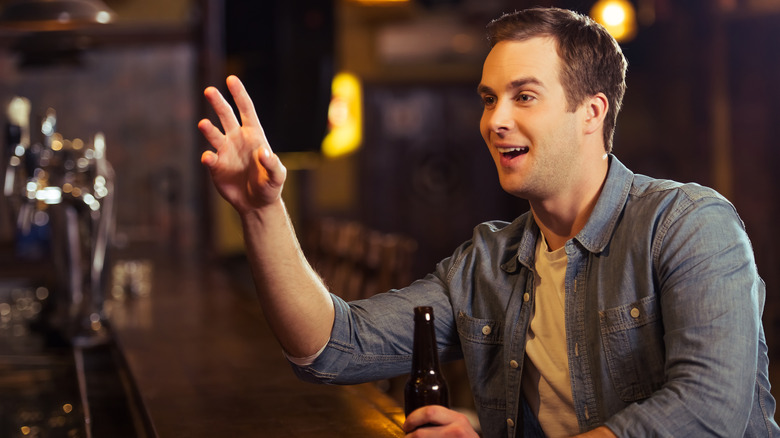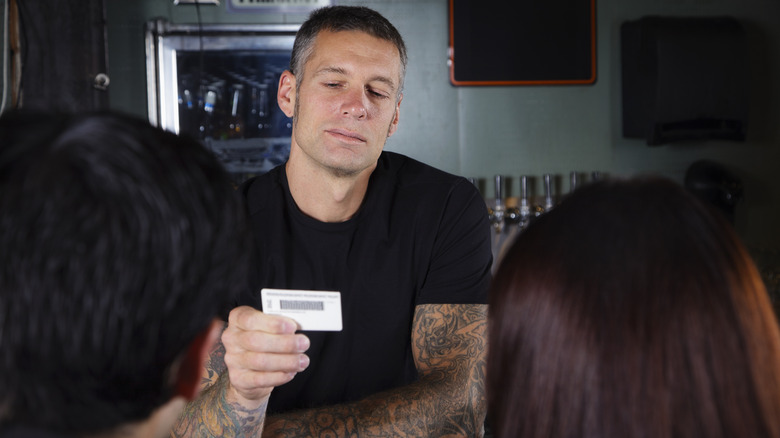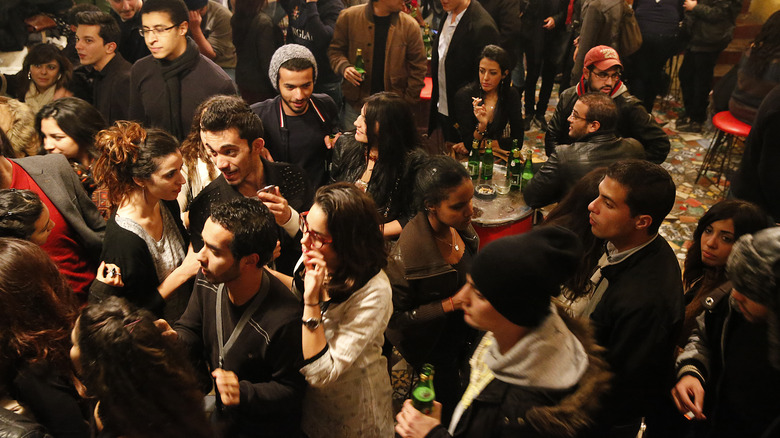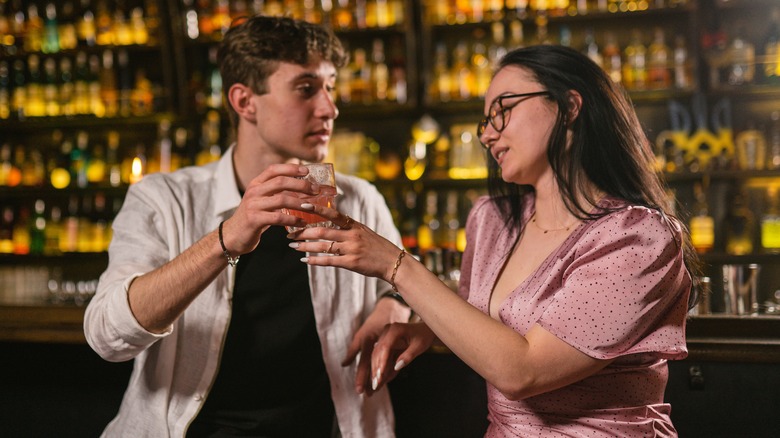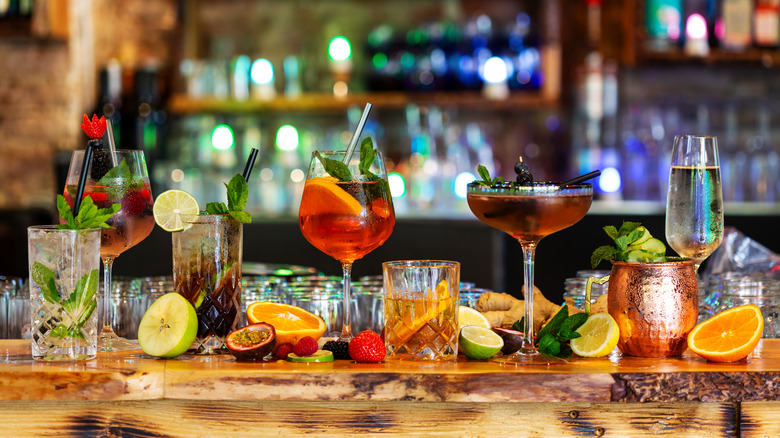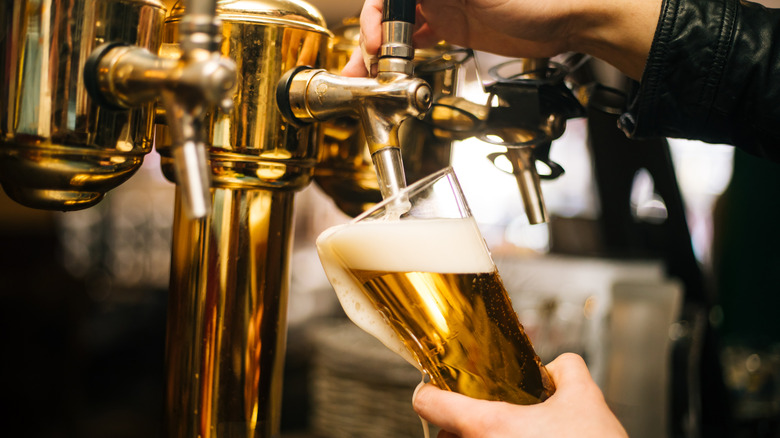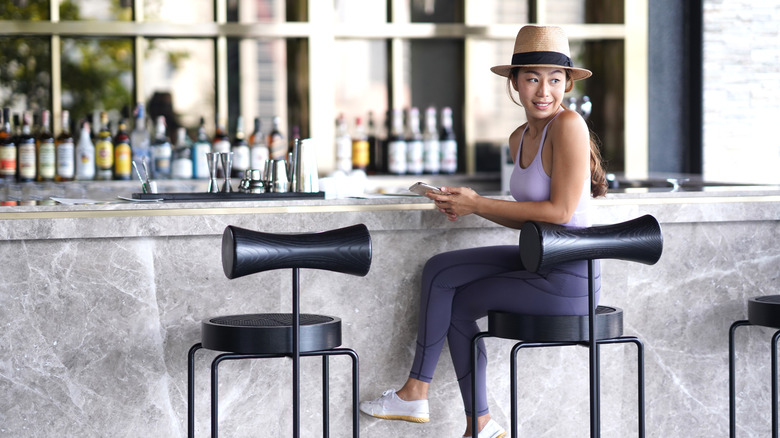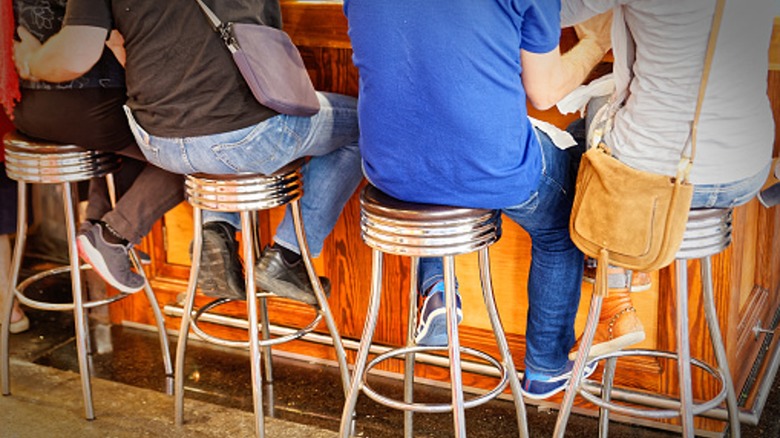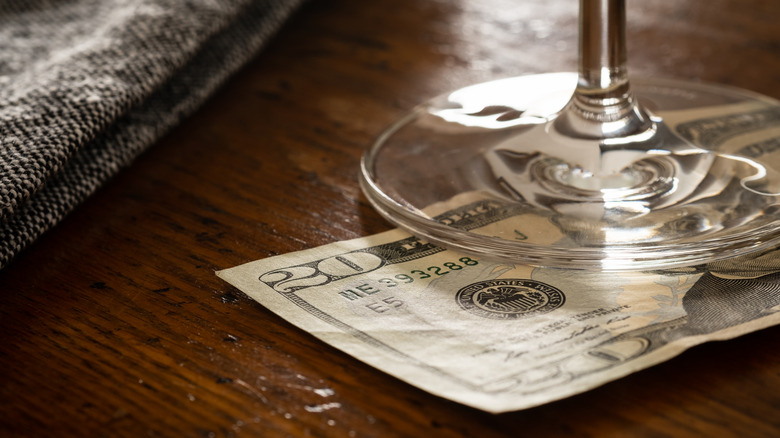Bar Etiquette Rules You Had No Idea You Were Breaking
When it comes to knowing how to act in a bar, some of it is common sense, but other etiquette rules are ones you may not realize you've been breaking. Whether you're a bar novice whose ideas of what a bar is like mainly come from television or you've been going to these establishments for years, there are probably things you didn't know.
While some bar etiquette rules are about being polite to those around you, others relate to safety and bartender income. Still others are based on liquor-related laws that you may not have realized exist. Because some of those laws can have extremely negative repercussions for bars or bartenders if they don't follow them (like fines, suspended liquor licenses, or jail time), you might think twice about your actions and requests next time you're in a bar. Here are some of the bar etiquette rules you may have been breaking without knowing it as well as reasons they're the best practice.
Don't ask for free drinks
It's not only gauche to ask for free drinks, but your bartender could be breaking serious laws by giving you one. Granted, there are some bars that have worked out ways for their bartenders to engender goodwill and get better tips by working in a certain number of free drinks, but there's usually very specific accounting that goes along with it to avoid breaking laws.
In some states, giving out impromptu discounts and free drinks can put the bar at risk for legal action. For example, in Massachusetts, a bar can have its liquor license suspended for three days to two weeks for offering free drinks (especially on a regular basis). Other states like Wisconsin allow giving away free alcohol only in the case of tasting samples. Meanwhile, states like Oklahoma neither allow giving away free drinks nor free samples. So, your bartender may not just be being frugal by refusing to give you one on the house.
Don't ask the bartender to make the drink stronger than usual
We've all been to that one bar where the drinks seem to be super weak. The weaker the drink, the more customers buy, right? Well, of course the bar wants to make a profit, but the reasons bartenders don't like you asking for stronger drinks come down to other factors, too: safety, laws, and flavor.
Many states have laws that forbid selling alcohol to visibly intoxicated patrons. So, it's in the bar's best interest not to make extremely strong drinks. If you ask for the drink to be made stronger than usual, you'll likely be charged for the extra alcohol. For example, in Oklahoma, there's a law on the books that doesn't allow the bartender to sell you a drink with extra alcohol without charging you more.
Another reason bartenders may not want to make a stronger version of the drink is that it can interfere with the overall flavor. If they change up a tried-and-true recipe, you may not be as satisfied with the drink. If you want more alcohol, order two drinks or order an extra shot and mix it in yourself. Or if you want a strong drink, ask for one that's already notoriously strong, like a Long Island Iced Tea.
Tip your bartender properly
While you may have assumed your bartender is earning a decent paycheck, most are working for a tipped minimum wage rate and depend on tips. If you're skimping on the tips, the bartender isn't making much money at all. So, that tip jar on the bar isn't for funsies; it might be the difference between the bartender being able to make rent this month or not.
The federal tipped minimum wage is still an archaic $2.13, but a tip credit takes it up to $7.25 in case a worker doesn't make enough in tips each hour. While 15 states mirror this same rate, many are close to double this amount. Still, it's not a living wage in many places without those extra tips.
So, how much should you be tipping your bartender? It depends on what you buy. A lot of people have developed a habit of tipping $1 per drink, but that's not always enough for higher-priced drinks. Tipping etiquette is different depending on whether you're ordering a beer, a glass of wine, or a cocktail. If it's just an ordinary cheap beer or glass of wine, that $1 to $2 tip per drink is probably fine since it's a good percentage of the cost. However, if they've gone to the effort or custom-crafting a cocktail for you, the amount should be more in line with what you would tip restaurant waitstaff – 15% to 20% of the total amount you pay for drinks.
Don't try getting drinks after last call
Trying to get drinks after last call is not only kind of pathetic, but it's also illegal. Pay attention to the time and that final call and don't try to weasel your way into an extra drink before you head out into the night. There are laws in almost every state and in some cities that dictate what time liquor sales must end or when customers must leave the building. Most bars will give you 10 to 15 minutes to buy and consume one last beverage, but that's it.
If you're from Louisiana or Nevada, you may not have realized that other bars have to close down at certain times in other states legally. For the large majority of the nation, bars cannot serve alcohol after 2 a.m. If you're in Mississippi or Florida, that time comes a lot sooner at midnight, while your bartender won't rein you in until 5 a.m. in Hawaii. Although, you might experience later last calls in some large cities like Miami or Chicago.
If you were goofing off and missed last call, don't ask for more drinks when the bar is getting ready to close down. Serving you after hours or even keeping the bar open after hours can result in the bar receiving penalties that could be as stiff as losing their liquor license altogether. You don't want to be the reason your favorite bar ends up closing down permanently.
Don't be a jerk if the bartender cuts you off
Here's the thing — you're not supposed to get drunk in a bar. In fact in many states, it's illegal for your bartender to make and serve you a drink if they can tell that you're intoxicated. You're probably not hiding being drunk as well as you think you are.
There are dozens of giveaways when you're drunk, like in your appearance, speech, attitude, and behavior. How much alcohol will make you drunk is affected by factors, including your size, metabolism, medicine consumption, food consumption, and fatigue level. According to blood alcohol level charts, most people are fine with one ordinary drink. Two generally puts you over the limit to drive if you're under 140 pounds for a male or under 160 pounds for a female. Three is usually only safe if you're a male over 240 pounds. Any more than that, and we're all pretty much sloshed.
All but 42 states have "dram shop laws" that allow a bartender to be held liable for crimes their patrons commit while drunk. So, if you kill someone with your car, or hurt someone in a fist fight after getting drunk in their bar, you're not the only person who could face charges. On the lighter end, the bartender or bar might be fined or they could lose their license. At the extreme end, they could face jail time. So, if your bartender cuts off your alcohol consumption, it's not just about you.
Never complain about being IDed
If you feel annoyed or offended by being IDed, it's time to get over it. It has nothing to do with whether you look your age or not. Yes, you knew that, but you probably didn't realize the serious implications for bars accidentally selling to minors.
If a bartender provides alcohol to someone under 21 years of age (even accidentally), they can be charged with a misdemeanor or a felony. Fines for bartenders serving minors can be as high as $5,000, with extras court fees and lawyer fees to pay as well. The bar can face consequences that can also include fines as well as having its license suspended or completely revoked. Plus, there are dram laws in many states that make anyone who serves the minor liable for crimes the minor commits while intoxicated.
The responsibility is for the bartender to check the ID and refuse to serve anyone who doesn't have one, is underage, or is clearly using a fake ID. So, have your ID ready to show when you order, so you can get it over with without a fuss.
Be aware of where you stand so you don't block traffic
A little self-awareness can go a long way in a bar. One of the unspoken etiquette rules that people tend to break has to do with getting in the way of foot traffic in the bar.
There's an interesting phenomenon that you've likely seen when people are with a group. They often get caught up in togetherness and conversation and forget that others exist. So, it's not uncommon for a whole wad of friends to block traffic, whether it's at the bar while ordering or while standing around having a good time. If you're congregated five people deep at the bar, nobody else can order. If everyone is blocking passage through the bar, people can't get to the restroom or other areas. Plus, the bartenders can't get drink orders out to everyone.
Also, notice where you are in relation to the serving area. Notice if you're blocking people's access to order or pay. If the bartender or waitstaff keep bumping into you or having to take the long way around you, you're in the way. And if you're standing at a place at the bar that has no stool and you have to move the bartender's things out of the way (like their garnishes and napkins) to enjoy your drink, you might be standing where you're not supposed to be. Find somewhere else to stand. There's a reason there's no obvious seating where you've decided to plant yourself.
Don't think buying someone a drink entitles you to anything
Okay. Here we go. You spending money to buy someone else a drink doesn't mean that they owe you anything. Nada. Zilch. Tamp down your expectations and allow yourself to be pleasantly surprised if buying a drink works the way you hope it will, but expect nothing. A thank you might be nice, but you might not even get that much.
Even if they accept your offered drink, it doesn't suddenly entitle you to anything. It doesn't mean you get a conversation, a date, or that they'll buy you the next drink. Your decision to buy a drink for someone doesn't automatically enact any obligation on the other person's part.
Then again, some people may refuse because they're not interested in talking or dating, you're intruding on their night out, they are done drinking for the night, or maybe they're just weirded out by the exchange. And if they don't see the bartender pour the drink themselves, they have every right to worry they're getting roofied.
Know what you want
When you get up to the bar, you should be ready to order. Especially if the bar is busy, stay away from the bartender until you know what you want unless you're asking for a menu.
If you ambiguously ask for "a beer" or "a cocktail," don't be surprised if you get something you don't want. A better request might be to ask the bartender to make their favorite drink for you if you don't have a plan. However, realize that it's your fault if these kinds of requests land you that one bottle of skunky beer nobody ever buys or a gin and tonic when you don't like gin.
If you don't have anything exactly in mind or can't think of the name of a drink on the fly, you can at least give the bartender a start with some guidelines for what you're looking for, including the type of alcohol and flavor profile, like "something fruity with vodka" or "something with orange juice." The internet is also your friend if the bar has no cocktail menu or you can't think of the name of a drink to order. There are plenty of lists online that you can plunder for ideas, like lists of classic cocktails to try.
Pay attention to what type of bar it is when making your order
Not every bar is the same, and you shouldn't expect to be able to get the same types of drinks. So, know what to expect before you go and before you order.
Some places keep it simple. They can make you beer, provide you with shots, or put together something simple like a rum and Coke, but don't expect something fancy. Look at what they've got behind the counter and adjust your expectations accordingly. If it's just beers on tap with a few bottles of whisky, vodka, gin, and rum, don't expect they can make you an Aperol Spritz. Your local dive bar isn't likely to have the ingredients on hand or want to bother with making the latest hipster bar drink or TikTok cocktail craze. Keep it simple.
On the other hand, if you're at a craft cocktail bar with an eclectic menu, and you ask for a Sprite and vodka, they're probably going to judge you a little. It pays to check the menu before you go if you're picky. If every drink has unusual ingredients like kiwi and sugar snap pea shrub and sesame ginger miso syrup, and that's not your kind of thing, you might want to go somewhere else instead.
Don't save a space for someone at the bar when it's busy
If bar space is at a premium, saving a seat for someone for longer than a handful of minutes can be rude. You might be able to hold a seat a little while, but eventually, you'll need to give it up.
If you're hogging an extra empty seat for a long time on a busy night, people are going to start questioning your claim on the seat. Five minutes might be fine, but when it's going on 20 minutes, it's time to relinquish your claim. Trying to hold several seats for people who aren't there yet when others need a place to sit is a real no-no. So, if someone asks if the seat is taken, it might be time to give up the seat.
Smaller bars may not even allow you to save a seat for five minutes. If people leave because they don't have anywhere to sit, it means the bar is losing money. So, if the bartender asks you to give up the seat because it's first-come-first serve, don't get up in arms. If you want to buy a few extra minutes, order your absent friend a drink to put in front of their seat so that they are a paying customer. And if it's a blind date that never shows, you've got yourself an extra drink for drowning your sorrows.
Consider sliding over at the bar when a couple wants to sit together
While we're talking about considering others while at the bar, let's talk about what happens when you're sitting alone and someone else needs your seat. No, you don't have to give up your spot just because you're a party of one. But if a couple or group comes in and you're in the way of them having adjacent spots, you might consider offering to move over one space so that they can sit together. Some people arriving alone at a bar gravitate toward the end seats to avoid this type of situation altogether.
Do you have to move? No. After all, you're a paying customer, too. But is it polite? Yes. Of course, if the other party is rude about the whole situation, it's going to make you less likely to want to move. It's also different if you're at a bar and grill and you have food in front of you at the bar. You could offer anyway, but moving all that food with you is a little more complicated than a simple slide over.
On the flip side, it's rude to demand someone to move for you and your party. You might ask politely if it looks like an easy switcharoo. Maybe even offer to buy them a drink for their troubles. But there's certainly no obligation for someone to move.
Keep a tab open with your debit or credit card but tip in cash
The best bar payment etiquette is to pay for your alcohol with your credit or debit card and bring along cash for tips. This practice saves time while keeping the bartender happy.
Keeping a tab open with your debit or credit card saves hassle for the bartender (in locations where this is allowed). Even with people paying their tab before they leave, bartenders still spend hours of their shift taking payments. Ringing up a new drink every time you decide you want one can be annoying and time-consuming. Granted, there may be a minimum to spend to open up a tab (possibly up to $20). But your bartender will appreciate it in the long run.
Since most bartenders are tipped employees, tips do make up a decent chunk of their income. And getting those tips in cash is helpful for a number of reasons. First of all, it's available immediately instead of the bartender having to wait to get it whenever paycheck day comes around. Secondly, they don't have to worry about getting their fair share if they have to split tips with other people working at the same time.
